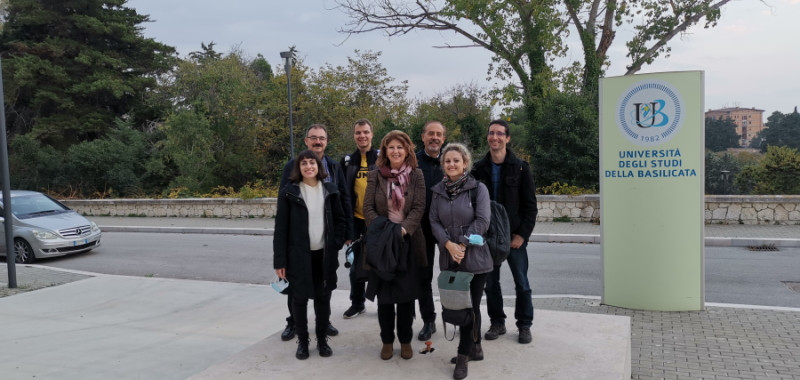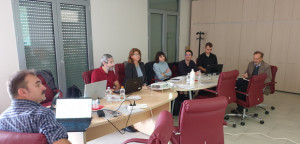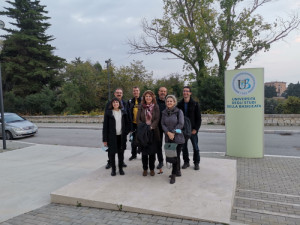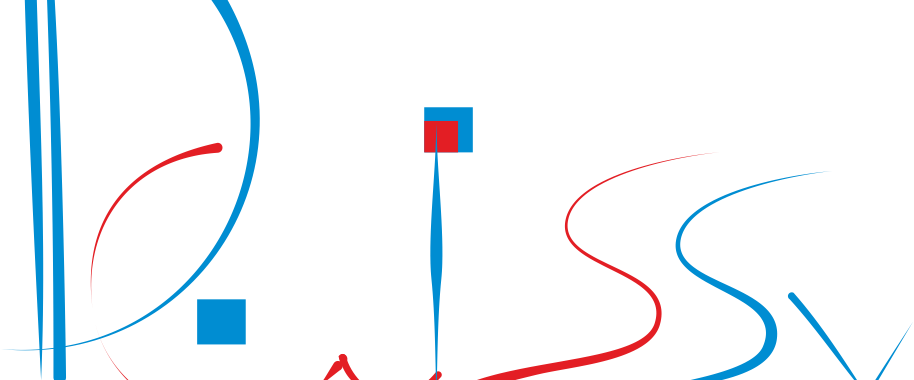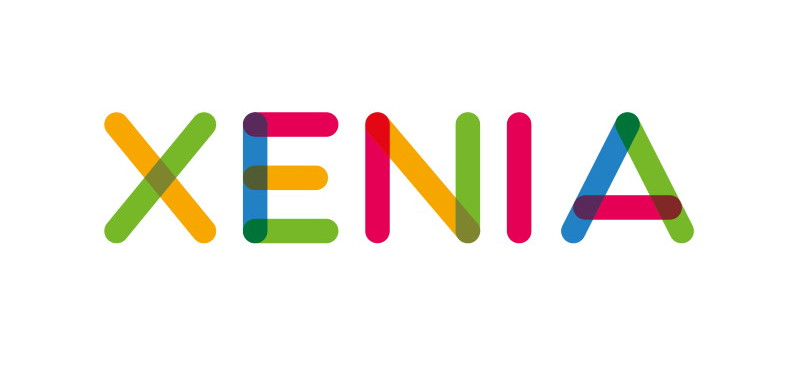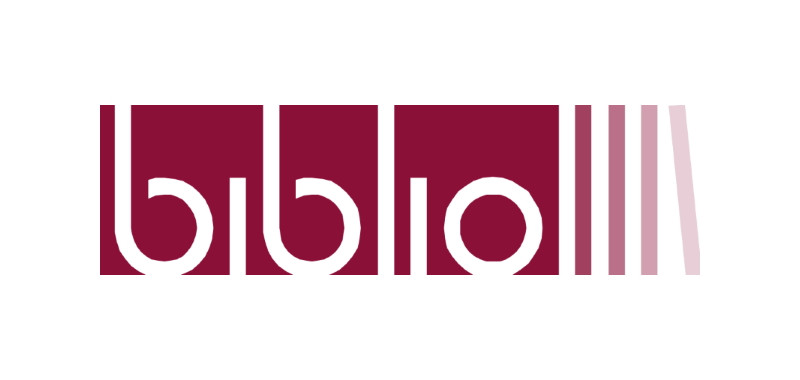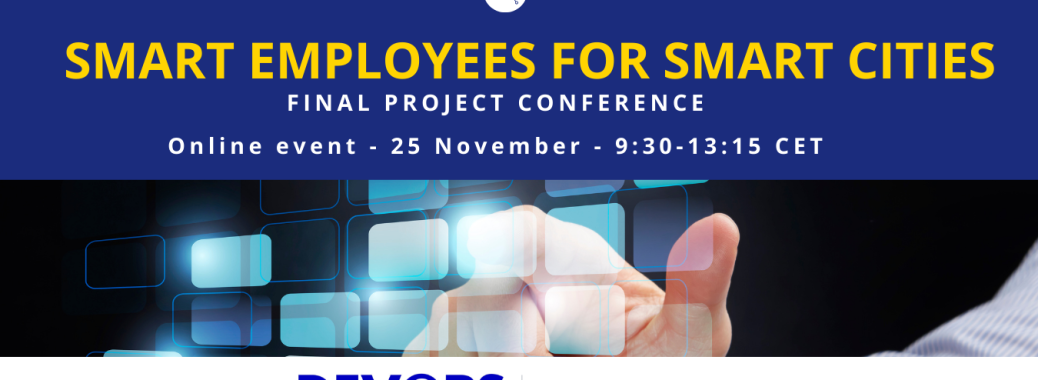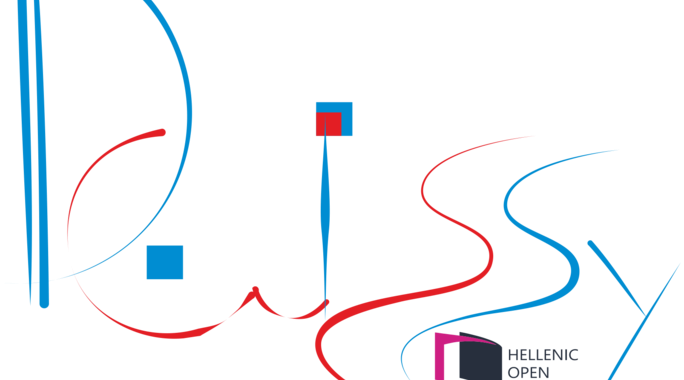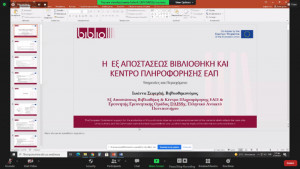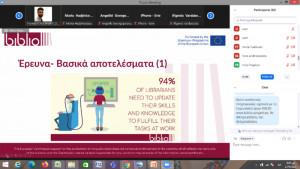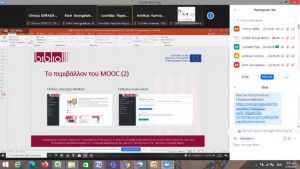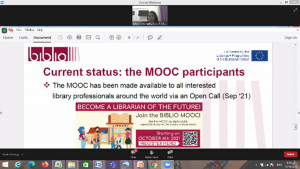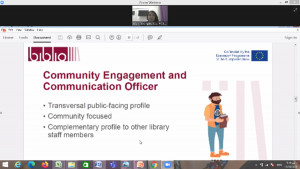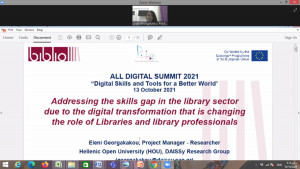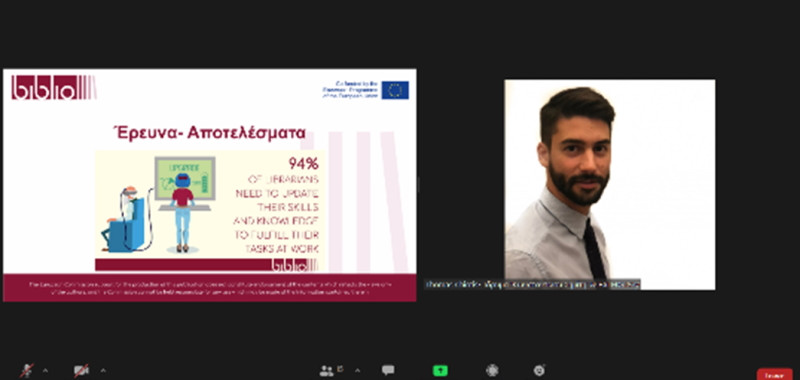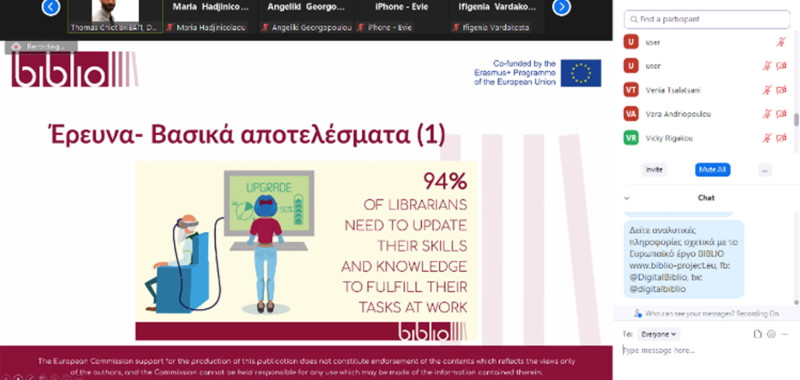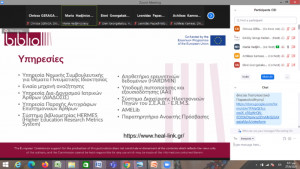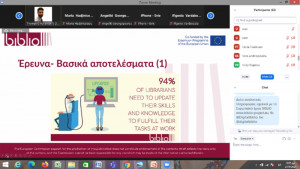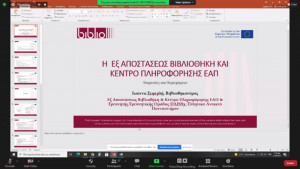The DELTA consortium participated to 5th project meeting in Matera, Italy
On the 11th and 12th November 2021, the DELTA consortium participated in person, in the fifth transnational meeting of the project in Matera, Italy, hosted by the Department of European and Mediterranean Cultures: Architecture, Environment, Cultural Heritage (DiCEM), University of Basilicata.
It was a marvelous moment meeting again with our colleagues, after the longtime of pandemic which restricted any travelling or group gathering!
The DELTA project – Digital Excavation through Learning and Training in Archaeology, is funded under the program Erasmus + / KA2 / Strategic Partnerships for Higher Education. The project is coordinated by the DAISSy research group of the Hellenic Open University (EAP). The project is implemented by a consortium of four partners – Universities from three countries (Greece, Italy and Czech Republic).
The meeting started with an overview of the project and its progress by Achilles Kameas, Head of the DAISSy Research Group, Hellenic Open University. After the implementation of the blended course entitled “Digital Excavation”, HOU, the Intellectual Output II leader, presented the results, main points of piloting the blended courses (IO2/A3) and the Certificates awarded through the online platform to successful learners. The programme, activities and the evaluation of the Intensive Study Programme (ISP) were presented by the Intellectual Output I leader, National Kapodistrian University of Athens, Greece. The ISP was a 5 days (11-15 October 2021) training programme for students of Archaeology from Greece – Italy and Czech Republic, with the collaboration of all partners, in a joint excavation at Plasi, Marathon.
Masaryk University presented the progress of the DELTA Teaching Handbook (IO1/A3) and the outline of the Policy recommendations document (IO1/A5).
The first day of the meeting ended with an open discussion among all partners who discussed on the possible adaptations and upgrade of all five (5) Modules as well as the subject of translations.
The second day of the web meeting included equally important presentations, regarding the pending issues of the DELTA like communication, dissemination policy for the more effective dissemination of the project results and deliverables. The fifth meeting closed with the presentation of the time –plan, financial & administrative issues and the exploitation of the project results of DELTA (HOU).
More information on the DELTA project:
Website : http://www.project-delta.eu/
Facebook : @projectdeltaeu – @DAISSyResearchGroup
Twitter : @deltaprojecteu – @daissy_research
Διαδικτυακή Εκδήλωση της DAISSy του ΕΑΠ με θέμα τον πολιτισμό, τον τουρισμό και την επιχειρηματικότητα

H ερευνητική ομάδα DAISSy του Ελληνικού Ανοικτού Πανεπιστημίου σας προσκαλεί να συμμετέχετε στη διαδικτυακή εκδήλωση με τίτλο «Η Πολιτιστική Κληρονομιά ως εφαλτήριο επιχειρηματικότητας», η οποία θα λάβει χώρα τη Δευτέρα 29 Νοεμβρίου 2021, στις 17:30 έως 20:00. Η εκδήλωση συνδιοργανώνεται με την υποστήριξη του συλλόγου «Ο Ιπποκράτης στη Λάρισα».
Η εκδήλωση θα πραγματοποιηθεί διαδικτυακά, μέσω της πλατφόρμας Zoom. Θα δοθούν βεβαιώσεις συμμετοχής. Οι προσκεκλημένοι ομιλητές – εκπρόσωποι από το χώρο του πολιτισμού, του τουρισμού και της επιχειρηματικής δραστηριότητας – θα παρουσιάσουν στρατηγικές, προγράμματα κατάρτισης και παραδείγματα καλών πρακτικών επιχειρηματικότητας στην προβολή και αξιοποίηση του πολιτισμικού αποθέματος καθώς και στην ενίσχυση του τουριστικού προϊόντος.
Η εκδήλωση απευθύνεται σε άτομα και εκπροσώπους ενώσεων, ιδρυμάτων και επιχειρήσεων σε τοπικό, εθνικό και ευρωπαϊκό επίπεδο. Συγκεκριμένα απευθύνεται σε επαγγελματίες πολιτισμού, διαχειριστές στον τομέα του πολιτισμού και τουρισμού, παρόχους επαγγελματικής εκπαίδευσης και κατάρτισης, συμβούλους επιχειρήσεων, διαχειριστές μικρομεσαίων επιχειρήσεων στον πολιτισμό και τουρισμό, φορείς που λαμβάνουν αποφάσεις, εκπροσώπους δήμων και πολιτιστικών συλλόγων καθώς και σε φοιτητές και αποφοίτους στον πολιτισμό και τουρισμό.
Μέσω της παρούσας φόρμας μπορείτε να πραγματοποιήσετε την εγγραφή σας.
Join Zoom Meeting
https://zoom.us/j/93743647009?pwd=NitiVGp1M05YOS9ucXM0RGt1MlJVQT09
Meeting ID: 937 4364 7009
Passcode: 951514
Για οποιαδήποτε πληροφορία μπορείτε να απευθυνθείτε στη διεύθυνση info@daissy.eap.gr
Πρόγραμμα
17.30 – 17.40: Έναρξη και χαιρετισμοί.
17.40 – 17.50: Παρουσίαση της ερευνητικής ομάδας DAISSy – Ελληνικό Ανοικτό Πανεπιστήμιο.
Δρ. Αχιλλέας Καμέας, Καθηγητής ΣΘΕΤ, Επικεφαλής DAISSy Research Group, Ελληνικό Ανοικτό Πανεπιστήμιο
17.50 – 18.00: Προοπτικές επιχειρηματικότητας στο δίκτυο των Ρωμαϊκών Δρόμων.
Βίκυ Μαράτου, Διαχειρίστρια έργων & ερευνήτρια DAISSy Research Group, Ελληνικό Ανοικτό Πανεπιστήμιο
18.00 – 18.10: Οι δρόμοι της επιχειρηματικότητας μέσα από την πολιτιστική διαδρομή των μνημείων της ευρύτερης περιοχής της Λάρισας.
Δρ. Σταυρούλα Σδρόλια, Προϊσταμένη της Εφορείας Αρχαιοτήτων Λάρισας
18.10 – 18.20: Πολιτιστικές Διαδρομές – Από τον Γλυπτό Ποταμό στο μνημείο του Ιπποκράτη στη Λάρισα.
Δρ. Ρίζος Χαλιαμπάλιας, Πρόεδρος του συλλόγου «Ο Ιπποκράτης στη Λάρισα»
18.20 – 18.30: Στα Τοπία του Αρχαίου Δράματος: Μια πρωτοβουλία βιωματικής σχέσης εκπαίδευσης, αρχαιολογικών χώρων και ελληνικής γραμματείας.
Κυριακή Σπανού, Καλλιτεχνική Διευθύντρια του Θεσσαλικού Θεάτρου
18.30 – 18.40: Στρατηγική ανάπτυξης επώνυμων τουριστικών προορισμών μέσω ειδικών μορφών τουρισμού.
Δρ. Κώστας Αλεξανδρής, Καθηγητής Αριστοτέλειο Πανεπιστήμιο Θεσσαλονίκης, Μέλος ΣΕΠ, Ελληνικό Ανοικτό Πανεπιστήμιο
Σύντομο διάλειμμα 10΄
18.50 – 19.00: Το πρόγραμμα «50 χιλιόμετρα» του Επιμελητηρίου Λάρισας.
Σωτήρης Γιαννακόπουλος, Πρόεδρος του Επιμελητηρίου Λάρισας
19.00 – 19.10: Οινοτουρισμός.
Αθανάσιος Ντούγκος, Οινοποιός
19.10 – 19.20: Μονοπάτια, πολιτισμός και επιχειρηματικότητα.
Νίκος Ντάγκας, Αντιδήμαρχος Τουρισμού Δήμου Αγιάς
19.20 – 19.30: Bar Engage: Δημιουργώντας νέους πρεσβευτές της πόλης, σε όλη την Ευρώπη μέσω της τοπικής «γεύσης».
Αλέξανδρος Σακελάρης, Επιχειρηματίας, εμπνευστής / συνδιοργανωτής του BARENGAGE
19.30 – 19.40: Πολιτισμός, Τουρισμός και Επιχειρηματικότητα μέσα από το έργο EUHeritage.
Παναγιώτα Πολυμεροπούλου, Αρχαιολόγος – Μουσειολόγος MSc., Ερευνήτρια DAISSy Research Group, Ελληνικό Ανοικτό Πανεπιστήμιο
19.40 – 19.50: Μια πιλοτική εφαρμογή του Experience design canvas για τους επαγγελματίες του πολιτισμού και τουρισμού στην Ελλάδα.
Ζωή Ακριβούλη, Οικονομολόγος-Σύμβουλος Επιχειρήσεων και Ανάπτυξης, Ερευνήτρια DAISSy Research Group, Ελληνικό Ανοικτό Πανεπιστήμιο
19.50 – 20.00: Ερωτήσεις-συζήτηση-κλείσιμο εκδήλωσης
The Deliverable 2.1 Xenia Inclusiveness Index of the Erasmus+ project XENIA that DAISSy Research Group of HOU is the Greek partner is now fully available online in English!
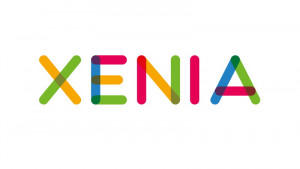 The Deliverable 2.1 – Xenia Inclusiveness Index of the Erasmus+ project XENIA is now fully available online in English. This document describes in detail the main activities that have been performed to develop the XENIA Inclusiveness Index – Beta version (Work Package 2 of the XENIA project). It also provides information aboutthe entire assessment process for Higher Education Institutions (HEIs) and how the Index will work.
The Deliverable 2.1 – Xenia Inclusiveness Index of the Erasmus+ project XENIA is now fully available online in English. This document describes in detail the main activities that have been performed to develop the XENIA Inclusiveness Index – Beta version (Work Package 2 of the XENIA project). It also provides information aboutthe entire assessment process for Higher Education Institutions (HEIs) and how the Index will work.
The Index will assist European HEIsin evaluating the equality and inclusiveness strategies that they adopt to address diversity (specifically based on sex, gender and sexual orientation) within their contexts.
The beta version of XENIA Inclusiveness Index consists of three key elements:
- Matrix for the HE specialised personnel, consisting of a series of objective indicators that assess the inclusiveness of a HEI;
- Survey for students and staff of HEIs to gauge the subjective perceptions of inclusiveness in the HEI;
- XENIA Index, that is a vector index that allows to summarise the information collected and record and interpret changes in specific values of the assessment process.
XENIA is a 36-month-lasting Erasmus + project that is currently been implemented by a consortium made up of 7 partners from 5 European countries (Italy, Spain, Slovenia, Ireland, Greece). Five European Universities (one in each country directly involved in the project) are about to start the piloting test of the Index beta version.
All materials are completely free and accessible from this link: https://xeniaindex.eu/pdf/wp2.pdf
For more information on XENIA and other DAISSy projects & activities:
- Website : http://daissy.eap.gr/en/projects/xenia/, https://www.xeniaindex.eu/
- Facebook : @DAISSyResearchGroup, @XENIA Erasmus+ Project
- Linkedin : https://www.linkedin.com/in/daissyresearchgroup/
- Twitter : https://twitter.com/daissy_research
- Instagram: @daissy_researchgroup
- Email : info@daissy.eap.gr
The BIBLIO project of the DAISSy Research Group of the HOU, partner in Greece was presented in the radio program entitled “Libraries on FM”!
 The promotion of the BΙBLIO-Boosting digital skills and competences for librarians in Europe project continues dynamically through the radio frequencies! In particular, the project is honored to be presented on the radio program entitled “Libraries on FM”, which is the first radio show ever organized in Greece that concerns Libraries! This program is an outcome of the cooperation of the Association of Greek Librarians and Information Scientists-EEVEP with the Municipal Library and the Municipal Radio Station “Communication 94FM” of the Municipality of Heraklion, Attica region, and it is organized once a week.
The promotion of the BΙBLIO-Boosting digital skills and competences for librarians in Europe project continues dynamically through the radio frequencies! In particular, the project is honored to be presented on the radio program entitled “Libraries on FM”, which is the first radio show ever organized in Greece that concerns Libraries! This program is an outcome of the cooperation of the Association of Greek Librarians and Information Scientists-EEVEP with the Municipal Library and the Municipal Radio Station “Communication 94FM” of the Municipality of Heraklion, Attica region, and it is organized once a week.
More precisely, the BIBLIO project was presented on Friday, October 22th 2021 (17: 00-18: 00), on the radio program coordinated by Christina Kyriakopoulou and Anthi Baliou, and edited by Frosso Pavlidou, all being members of the EEVEP.
The presentation of BIBLIO was delivered by Thomas Chiotis, Archivist-Librarian, member of the working group of the DAISSy Research Group of the Hellenic Open University (HOU), partner in Greece, and began with a brief description of the project content and its objectives. Then, a detailed description was made about all types of the research carried out during the implementation of the BIBLIO project as well as the research results, which led to the two emerging job role profiles in the Library world: the Community Engagement and Communication-CECO and the Digital Transformation Facilitator-DIGY . The presentation was finalized by referring to the content of the BIBLIO MOOC modules, emphasizing on the benefits of developing new skills, to be gained by those participating in the training program.
- Besides the BIBLIO project, the topics of the radio program also included a special tribute to the General State Archives (GSA)-Department of GSA of Fthiotida area as well as a reference to the 27th PanΗellenic Conference of Academic Libraries.
- The DAISSy Research Group of the HOU is thankful to the Association of Greek Librarians and Information Scientists-EEVEP about the invitation to participate in the «Libraries on FM» radio program. DAISSy-HOU wishes for enhanced cooperation with the EEVEP, towards the development of additional joint actions for the benefit of the Library community in Greece.
- The DAISSy Research Group of the HOU is the Greek partner of the BIBLIO project (ERASMUS+ / 612411-EPP-1-2019-1-IT-EPPKA2-SSA) and implements it, in cooperation with the Distance Library and Documentation Centre (DLIC) of the HOU, associate partner.
Stay tuned and remember to visit the site of the BIBLIO project and to check the “Stories” of the BIBLIO partners! https://www.biblio-project.eu/stories/
For more information about the BIBLIO project as well as other activities of the DAISSy-HOU:
- Website : http://daissy.eap.gr/en/https://www.biblio-project.eu/
- Facebook : @DAISSyResearchGroup, @DigitalBiblio
- Linkedin: https://www.linkedin.com/in/daissyresearchgroup/
- Twitter : https://twitter.com/daissy_research, @digitalbiblio
- Instagram: @daissy_researchgroup
- Email : info@daissy.eap.gr
Smart Employees for Smart Cities online conference with the participation of the DAISSy research team of Hellenic Open University
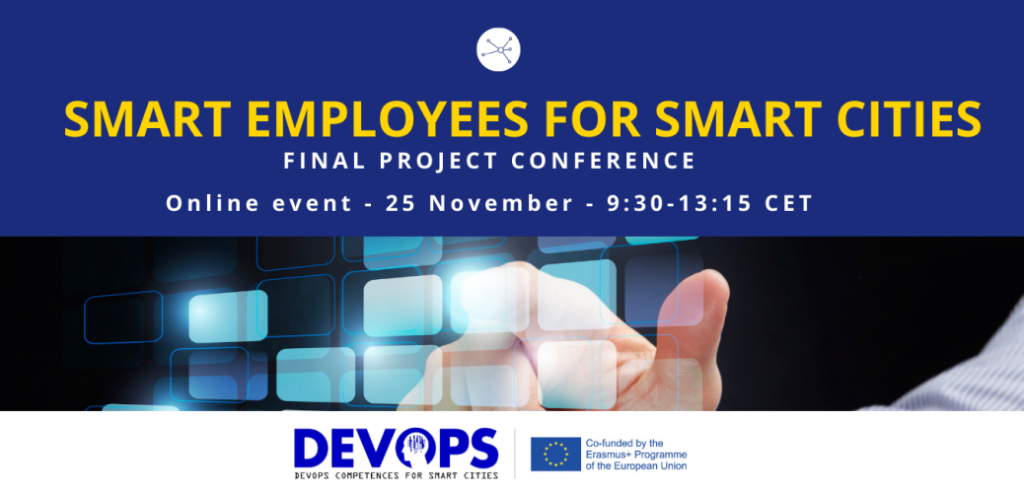
On Thursday, 25 November, from 9:30-13:15 CET, the DevOps competences for Smart Cities (Smart DevOps) project consortium will hold a final project’s online conference titled Smart Employees for Smart Cities. Those attending will have the opportunity to learn how to bridge the gap between today’s and future’s skills demands of the municipal workforce.
Smart cities are complex ecosystems that use information and communication technologies for helping their citizens and organizations deal with the challenges of urbanization, safety, resilience, and sustainability. Their creation is a long and laborious transformation that should not be considered mainly as a technical challenge but as a movement to create citizen-centred ecosystems that improve quality of life and stimulate economic activity.
A highly skilled workforce is key in rendering smart city ecosystems a reality. Even though billions of euros are invested in technological or urban development, not sufficient effort has been spent in training the necessary workforce with the skills needed in smart cities ecosystems.
The Smart DevOps project aims to close the gap between today’s and future’s skills demands of the municipal workforce by emphasizing the exploitation of emerging employment paradigms such as DevOps. The key advantage of DevOps is that it allows to innovate and rapidly deploy innovative solutions for the citizens. This was the premise and also a starting point of the DevOps competences for Smart Cities project.
At the final conference, we will present project deliverables, pilot activities results and facilitate discussions about the future of skills development in the Smart Cities sector. Specifically, you will hear about and be able to discuss:
- Key transversal and specific competencies for Smart Cities professionals
- 3 new emerging Smart City job profiles (Smart City Planner, Smart City IT Manager, Smart City IT Officer)
- Vocational Curricula for the three job profiles delivered through the Massive Online Open Course and Specialisation Courses
- Results of extensive pilot training attended by hundreds of trainees
- Smart City Body of Knowledge
- A growing community of Smart Cities stakeholders (IT and tech experts, public officials and employees)
The conference targets individuals and representatives of associations, institutions and businesses from local, national and European levels, namely (the list below is not exhaustive):
- Smart Cities professionals
- Municipalities and cities representatives
- IT experts
- VET providers
- Decision-makers
- Policy-makers
- Smart Cities Consultants
- Smart Cities Researchers
Conference programme
09:30 – 09:40 Welcome and introduction
Peter Palvoglyi, CEO of ALL DIGITAL
09:40 – 10:00 Keynote speech: Career challenges in smart cities – How does the digital transformation of cities affect careers and what has to be done towards a sustainable career ecosystem in smart cities?
Prof Dr Judith Hilde Semeijn, Open University of the Netherlands
10:00 – 10:20 Emerging smart city job roles and skills – The DevOps findings
Prof. Dr. Hans Rüdiger Kaufmann, The University of Applied Management Studies Manheim
10:20 – 10:40 Design and delivery of the Smart DevOps Curricula
Dr Theodor Panagiotakopoulos, Hellenic Open University
10:40 – 10:55 Fireside chat
Upskilling and introducing new profiles in the municipality and smart city administrations
10:55 – 11:10 Break
11:10 – 11:25 Pilot delivery of the Smart DevOps Curricula – Smart DevOps Massive Open Online Course (MOOC)
Prof Angelika Kokkinaki, University of Nicosia – EDEX
11:25 – 11:40 Pilot delivery of the Smart DevOps Curricula – Specialization courses and Work-based learning
Vasilis Kyriatzis, University of Thessaly
11:40 – 11:55 Fireside chat
Discussion with MOOC and specialisation courses participants
11:55 – 12:25 Smart Cities Body of Knowledge
Prof Dr Panos Fitsilis, University of Thessaly
Prof Angelika Kokkinaki, University of Nicosia – EDEX
12:25 – 12:45 Q&A about project results
12:45 – 13:10 Fireside chat:
What is the future of Smart Cities and how to prepare for it?
13:10 – 13:15 Closing of the conference
Prof Dr Panos Fitsilis, University of Thessaly
Ανοικτή δια ζώσης εκδήλωση του έργου INSTRUCTION
Την Πέμπτη 25 Νοεμβρίου 2021, ώρα 18:00 – 20:00, η ερευνητική ομάδα DAISSy του Ελληνικού Ανοικτού Πανεπιστημίου, διοργανώνει τη δια ζώσης εκδήλωση διάχυσης των αποτελεσμάτων του έργου INSTRUCTION, με τίτλο “Αναβάθμιση δεξιοτήτων εκπαιδευτικών σχολείων για την υποστήριξη της μετάβασης από την εκπαίδευση στην εργασία”. Το έργο INSTRUCTION στοχεύει στη δημιουργία ενός καινοτόμου μοντέλου διδασκαλίας για τη διευκόλυνση της μετάβασης των μαθητών από την εκπαίδευση στον κόσμο της εργασίας·και την ενδυνάμωση του δεσμού μεταξύ σχολείων και επιχειρήσεων.
Η συμμετοχή είναι δωρεάν και θα δοθούν βεβαιώσεις συμμετοχής.
Μετά το πέρας της εκδήλωσης θα διατεθεί δωρεάν ελαφρύ βραδινό γεύμα για τους συμμετέχοντες.
Για την πρόσβαση στου χώρους της εκδήλωσης, ισχύουν όλα τα περιοριστικά μέτρα που έχουν ανακοινωθεί από τους αρμόδιους φορείς.
Δείτε το πρόγραμμα της εκδήλωσης.
Για περισσότερες πληροφορίες σχετικά με το έργο INSTRUCTION και άλλα έργα και δράσεις της DAISSy:
- Ιστοσελίδα : http://daissy.eap.gr/en/projects/instruction/
- Facebook : @DAISSyResearchGroup
- Linkedin : https://www.linkedin.com/in/daissyresearchgroup/
- Twitter : https://twitter.com/daissy_research
- Instagram : @daissy_researchgroup
- Email : info@daissy.eap.gr
The 1st National dissemination event of the BIBLIO project organized by DAISSy Research Group-HOU in Greece, was a real success!
Undoubtedly, the national dissemination event in Greece, entitled “Enhancing the digital skills of the Library community“, was a very successful initiative! It was organized online on 27th September 2021 by the DAISSy Research Group of the Hellenic Open University (HOU), within the framework of the implementation of the “BIBLIO: Boosting digital skills ad competencies for librarians in Europe” EU project. It triggered the interest of library professionals, experts and practitioners, representatives of authorities and institutions, active citizens, and more generally anyone interested in the digital evolution within the library world.
More precisely, the dissemination event included six (6) speakers, was attended by more than sixty (60) participants and addressed not only the multiple challenges but also the significant opportunities of the libraries in the digital era, as identified through the BIBLIO project outcomes.
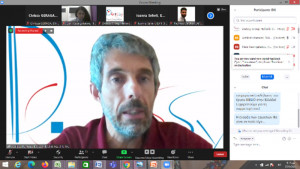 Prof Achilles KAMEAS, Director of DAISSy and Scientific Coordinator of the BIBLIO project in Greece, launched the event by welcoming the participants and then, presenting the valuable work done by the DAISSy Research Group of the HOU. The map of currently ongoing projects was impressive – he emphasized on the strong international character of the Group and its involvement and representation in international networks and scientific boards. He also addressed the firm links achieved by DAISSy in order to relate the BIBLIO project with other ongoing EU projects under implementation (such as DELTA, SILVHER, etc.) aiming at producing a net for the transfer of results and the enhancement of sustainability.
Prof Achilles KAMEAS, Director of DAISSy and Scientific Coordinator of the BIBLIO project in Greece, launched the event by welcoming the participants and then, presenting the valuable work done by the DAISSy Research Group of the HOU. The map of currently ongoing projects was impressive – he emphasized on the strong international character of the Group and its involvement and representation in international networks and scientific boards. He also addressed the firm links achieved by DAISSy in order to relate the BIBLIO project with other ongoing EU projects under implementation (such as DELTA, SILVHER, etc.) aiming at producing a net for the transfer of results and the enhancement of sustainability.
Then Ioanna SEFERLI, Librarian, representing the Distance Library and Information Centre of the HOU (DLIC-HOU) delivered a speech about the activities of this unit. She presented the e-services of the Centre and in parallel she pinpointed the extrovert nature of the DLIC operation in supporting both numerous initiatives of the Academic Libraries in Greece and projects carried out by the Schools and Research Groups of the HOU. In parallel she explained the role of the DLIC of the HOU as the fundamental associate partner of the DAISSy Research Group for the implementation of the BIBLIO project in Greece.
The Project Manager of BIBLIO and researcher of DAISSy-HOU, Eleni GEORGAKAKOU, took the floor and triggered the interest of the participants about the content of the project and its methodology. Through a brief presentation of all BIBLIO work-packages, she emphasized on the demanding project concept, its strong European partnership, its direct link with the needs and challenges of the modern library world and the effective way that the BIBLIO project addresses those challenges and provides tools that benefit the personal development of the library professionals.
The speech delivered by Thomas CHIOTIS, Archivist-Librarian at “Constantinos Simitis Foundation”, followed. It included a detailed description of all types of the research carried out by the BIBLIO project and its findings. Thomas, emphasized on the need expressed by the librarians to update their skills to fulfill their tasks at work and more precisely, their need for strong basic digital skills to answer users’ queries and ensure a level of digital autonomy. He showcased how two new job profiles emerged and presented the expected multiple roles of the Community Engagement and Communication-CECO and the Digital Transformation Facilitator-DIGY.
Then, Leonidas PAPACHRISTOPOULOS, Librarian at DLIC-HOU, presented in detail the BIBLIO MOOC putting emphasis on the way it is linked with the research findings and the tasks of the new job role profiles of CECO and DIGY, so that to address them effectively. All BIBLIO MOOC modules were briefly described as well the timetable, study effort and benefits. Leonidas, also referred to the multi-dimensional content of the BIBLIO training program, by explaining that the MOOC is part of the modular training programme for the development of the competences included in the CECO and DIGY job role profiles, to be followed by the BIBLIO blended training course and the work-based learning activities.
The last speech of the event was delivered by Prof Maria Hatzinikolaou, who is a Professor of HOU and the Deputy Scientific Coordinator of the BIBLIO project in Greece. In parallel she is a member of the Administrative Board of the HEALink (Hellenic Academic Libraries link) and she is fully aware of the role of this association and its activities at national and international level. Therefore, she presented briefly a set of distinctive initiatives of the association and showcased how they are benefited by the BIBLIO findings. In addition, she emphasized on the relation achieved among the HEALink, the DAISSy and the DLIC-HOU towards the promotion as well as the exploitation of both the BIBLIO MOOC and the rest of the project deliverables.
The presentations were completed by announcing the BIBLIO MOOC call for registrations and its official launch on 4th October 2021 and explaining the registration process which is open (until then) and free of charge.
A brief but vivid discussion took place at the end of the event, through the exchange of questions-answers, comments and interventions by the participants. More precisely, they acknowledged the need for the digital autonomy of the library professionals and the new skills for coping with the challenges of serving their library users through a holistic approach, they made positive remarks on the research findings, they confirmed the importance of the BIBLIO MOOC and expressed their initial interest in its content.
The national event was organized in Greek, a pre-registration process was applied for attending it and all participants received certificates. The organizer has kept all related material (invitations, proof of promotional actions, registration forms, certificates, presentations, photos, etc.) within the dossier of the event.
The DAISSy Research Group of the Hellenic Open University (HOU), Coordinator of the event, is thankful to all organizations that supported the event (especially the DLIC-HOU being the associate partner), as well as the speakers, the experts and every participant for their contribution to the success of the organisation.
Find out more about BIBLIO and other activities of DAISSy at:
- Website : http://daissy.eap.gr/en/ https://www.biblio-project.eu/
- Facebook : @DAISSyResearchGroup, @DigitalBiblio
- Linkedin : https://www.linkedin.com/in/daissyresearchgroup/
- Twitter : https://twitter.com/daissy_research, @digitalbiblio
- Instagram: @daissy_researchgroup
- Email : info@daissy.eap.gr
The BIBLIO project was presented at ALL DIGITAL SUMMIT 2021 by DAISSy-HOU, the Greek partner!
The BΙBLIO project is honored to be presented at the ALL DIGITAL Summit (13-15.10.2021)! The BIBLIO presentation was included in the first round table entitled “Lightning talks and Informative sessions” in the afternoon of the first day of the Summit – this session was dedicated to the applications regarding a) the digital competences of professionals in the sectors of education, libraries (etc.) and the beneficial role they play to their personal development and b) the awareness about tackling inequalities and discrimination (e.g. managing hate speech and gender inclusiveness).
Within this framework, the characteristics of the BIBLIO emerging role profiles in Libraries i.e. the Community Engagement and Communication-CECO and the Digital Transformation Facilitator-DIGY, were showcased.
Emphasis was put to presenting the content of the BIBLIO MOOC modules and the benefits of attending them, as well as the development of the MOOC e-platform by DAISSy Research Group of the Hellenic Open University (HOU). It was clarified that the MOOC is only a part of the multidimensional BIBLIO blended training course.
- The AD Summit 2021 was implemented online and triggered the interest of academics, researchers, representatives of local government organizations, professionals in the sectors of culture, education, environment, etc.
- The speech was delivered by Eleni GEORGAKAKOU, Project Manager of BIBLIO in DAISSy Research Group of HOU. The Group is a member of the ALL DITIGAL network and implements the BIBLIO project in Greece, with the Distance Library and Documentation Centre of the HOU, as the fundamental associate partner.
Stay tuned and remember to visit the site of the BIBLIO project and to check the “Stories” of the BILBIO partners! https://www.biblio-project.eu/stories/
For more information about the BIBLIO project as well as other activities of the DAISSy-HOU:
- Website : http://daissy.eap.gr/en/ https://www.biblio-project.eu/
- Facebook : @DAISSyResearchGroup, @DigitalBiblio
- Linkedin : https://www.linkedin.com/in/daissyresearchgroup/
- Twitter : https://twitter.com/daissy_research, @digitalbiblio
- Instagram: @daissy_researchgroup
- Email : info@daissy.eap.gr
Το έργο BIBLIO της Ερευνητικής Ομάδας DAISSy του ΕΑΠ, φορέας-εταίρος στην Ελλάδα, κεντρίζει το ενδιαφέρον στις ERASMUS DAYS 2021!
 Το έργο BΙBLIO παρουσιάστηκε με ιδιαίτερη επιτυχία στις «ERASMUS DAYS 2021»! Ειδικότερα, η παρουσίαση του έργου αποτέλεσε τμήμα της πρωτοβουλίας «DAISSy Days» που διοργάνωσε η Ερευνητική Ομάδα DAISSy του Ελληνικού Ανοικτού Πανεπιστημίου, για τον εορτασμό του θεσμού των ERASMUS DAYS 2021. Πρόκειται για καινοτόμο πρωτοβουλία της Ερευνητικής Ομάδας, η οποία διαθέτει αξιόλογη πολυετή εμπειρία στην υλοποίηση Ευρωπαϊκών έργων, συμπεριλαμβανομένων των πολυάριθμων έργων, που υλοποιεί, χρηματοδοτουμένων μέσω του Ευρωπαϊκού προγράμματος ERASMUS+.
Το έργο BΙBLIO παρουσιάστηκε με ιδιαίτερη επιτυχία στις «ERASMUS DAYS 2021»! Ειδικότερα, η παρουσίαση του έργου αποτέλεσε τμήμα της πρωτοβουλίας «DAISSy Days» που διοργάνωσε η Ερευνητική Ομάδα DAISSy του Ελληνικού Ανοικτού Πανεπιστημίου, για τον εορτασμό του θεσμού των ERASMUS DAYS 2021. Πρόκειται για καινοτόμο πρωτοβουλία της Ερευνητικής Ομάδας, η οποία διαθέτει αξιόλογη πολυετή εμπειρία στην υλοποίηση Ευρωπαϊκών έργων, συμπεριλαμβανομένων των πολυάριθμων έργων, που υλοποιεί, χρηματοδοτουμένων μέσω του Ευρωπαϊκού προγράμματος ERASMUS+.
Αναλυτικότερα, η παρουσίαση του έργου BIBLIO εντάχτηκε στη θεματική ενότητα με τίτλο «Απόκτηση νέων δεξιοτήτων σε επαγγελματικούς τομείς» (Παρασκευή 15.10.2021, 16.00-17.30’), όπου αναδείχτηκαν Ευρωπαϊκά έργα που υλοποιεί η Ερευνητική Ομάδα DAISSy-ΕΑΠ με στόχο την ανάπτυξη δεξιοτήτων επαγγελματιών στον χώρο της εκπαίδευσης, των Βιβλιοθηκών, της τοπικής αυτοδιοίκησης («έξυπνες» πόλεις), του τουρισμού, της ενέργειας («έξυπνος» φωτισμός») και του πολιτισμού.
Ειδικότερα, στο πλαίσιο της παρουσίασης του έργου BIBLIO αναλύθηκαν τα επιμέρους είδη έρευνας που πραγματοποιήθηκαν κατά την υλοποίηση του έργου BIBLIO και τα ευρήματά τους. Υπογραμμίστηκε η ανάγκη που εκφράζουν οι βιβλιοθηκονόμοι για να αναβαθμίσουν τις δεξιότητές τους, ώστε να εκπληρώνουν με ολοκληρωμένο τρόπο, τα καθήκοντά τους στην εργασία στην ψηφιακή εποχή.
Παρουσιάστηκε ο τρόπος με τον οποίο μέσω του BIBLIO, αναδείχτηκαν δύο νέοι εργασιακοί ρόλοι του-της Υπεύθυνου-ης Επικοινωνίας και Συμμετοχικότητας της Κοινότητας (Community Engagement and Communication-CECO) και του-της Διαμεσολαβητή-τριας Ψηφιακού Μετασχηματισμού (Digital Transformation Facilitator-DIGY), καθώς και τα πολλαπλά αντικείμενα των καθηκόντων τους.
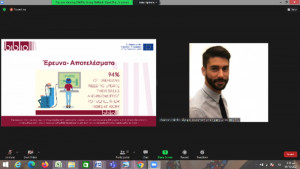 Δόθηκε έμφαση στο περιεχόμενο των ενοτήτων του BIBLIO MOOC και των ωφελειών συμμετοχής στο μάθημα, καθώς επίσης και της ανάπτυξης της ηλεκτρονικής πλατφόρμας του BIBLIO MOOC από την DAISSy-ΕΑΠ. Επιπλέον, τονίστηκε το πολυδιάστατο περιεχόμενο του συνολικού αρθρωτού προγράμματος κατάρτισης του έργου BIBLIO.
Δόθηκε έμφαση στο περιεχόμενο των ενοτήτων του BIBLIO MOOC και των ωφελειών συμμετοχής στο μάθημα, καθώς επίσης και της ανάπτυξης της ηλεκτρονικής πλατφόρμας του BIBLIO MOOC από την DAISSy-ΕΑΠ. Επιπλέον, τονίστηκε το πολυδιάστατο περιεχόμενο του συνολικού αρθρωτού προγράμματος κατάρτισης του έργου BIBLIO.
- Οι εργασίες των «DAISSy Days» στο πλαίσιο εορτασμού του θεσμού των ERASMUS DAYS 2021, πραγματοποιήθηκαν διαδικτυακά, κερδίζοντας το ενδιαφέρον ακαδημαϊκών, ερευνητών-τριών καθώς και επαγγελματιών στο χώρο της εκπαίδευσης, της τοπικής αυτοδιοίκησης, του πολιτισμού, το τουρισμού, της ενέργειας, κλπ.
- Η Ερευνητική Ομάδα DAISSy του Ελληνικού Ανοικτού Πανεπιστημίου υλοποιεί το έργο BIBLIO (Ευρωπαϊκό πρόγραμμα ERASMUS+ / 612411-EPP-1-2019-1-IT-EPPKA2-SSA) ως φορέας-εταίρος στην Ελλάδα, με την Εξ Αποστάσεως Βιβλιοθήκης & Κέντρου Πληροφόρησης του ΕΑΠ ως βασικό συνεργάτη.
Μείνετε συντονισμένοι και θυμηθείτε να επισκέπτεστε την ιστοσελίδα του BIBLIO και να παρακολουθείτε τις ιστορίες (“Stories”) από τους φορείς εταίρους του έργου! https://www.biblio-project.eu/stories/
Δείτε περισσότερες πληροφορίες για το έργο BIBLIO καθώς κι άλλες δράσεις της Ερευνητικής Ομάδας DAISSy-ΕΑΠ:
- Website : http://daissy.eap.gr/en/ https://www.biblio-project.eu/
- Facebook : @DAISSyResearchGroup, @DigitalBiblio
- Linkedin : https://www.linkedin.com/in/daissyresearchgroup/
- Twitter : https://twitter.com/daissy_research, @digitalbiblio
- Instagram: @daissy_researchgroup
- Email : info@daissy.eap.gr
Επιτυχής διοργάνωση από την Ερευνητική Ομάδα DAISSy του ΕΑΠ της 1ης ενημερωτικής εκδήλωσης εθνικής εμβέλειας του έργου BIBLIO!
 Αναμφίβολα, η ενημερωτική εκδήλωση με τίτλο «Ενισχύοντας τις ψηφιακές δεξιότητες της Βιβλιοθηκονομικής κοινότητας», στέφθηκε με επιτυχία! Αποτελεί δράση εθνικής εμβέλειας που διοργανώθηκε διαδικτυακά στις 27 Σεπτεμβρίου 2021 από την Ερευνητική Ομάδα DAISSy του Ελληνικού Ανοικτού Πανεπιστημίου (ΕΑΠ), στο πλαίσιο της υλοποίησης του Ευρωπαϊκού έργου “BIBLIO: Boosting digital skills ad competencies for librarians in Europe”, ως εταίρος στην Ελλάδα. Η εκδήλωση κέντρισε το ενδιαφέρον των επαγγελματιών του τομέα της Βιβλιοθήκης, εμπειρογνωμόνων, εκπροσώπων αρχών και ιδρυμάτων, ενεργών πολιτών και γενικότερα όλων όσων ενδιαφέρονται για την ψηφιακή εξέλιξη στον κόσμο της Βιβλιοθήκης.
Αναμφίβολα, η ενημερωτική εκδήλωση με τίτλο «Ενισχύοντας τις ψηφιακές δεξιότητες της Βιβλιοθηκονομικής κοινότητας», στέφθηκε με επιτυχία! Αποτελεί δράση εθνικής εμβέλειας που διοργανώθηκε διαδικτυακά στις 27 Σεπτεμβρίου 2021 από την Ερευνητική Ομάδα DAISSy του Ελληνικού Ανοικτού Πανεπιστημίου (ΕΑΠ), στο πλαίσιο της υλοποίησης του Ευρωπαϊκού έργου “BIBLIO: Boosting digital skills ad competencies for librarians in Europe”, ως εταίρος στην Ελλάδα. Η εκδήλωση κέντρισε το ενδιαφέρον των επαγγελματιών του τομέα της Βιβλιοθήκης, εμπειρογνωμόνων, εκπροσώπων αρχών και ιδρυμάτων, ενεργών πολιτών και γενικότερα όλων όσων ενδιαφέρονται για την ψηφιακή εξέλιξη στον κόσμο της Βιβλιοθήκης.
Ειδικότερα, η ενημερωτική εκδήλωση περιλάμβανε έξι (6) ομιλίες, τις οποίες παρακολούθησαν περισσότεροι-ες από εξήντα (60) συμμετέχοντες-ουσες και διαπραγματεύτηκε όχι μόνο τις πολλαπλές προκλήσεις αλλά και τις σημαντικές ευκαιρίες για τις Βιβλιοθήκες στην ψηφιακή εποχή, όπως αυτές προσδιορίστηκαν μέσω των ευρημάτων του έργου BIBLIO.
 Ο Δρ Αχιλλέας Καμέας, Καθηγητής ΕΑΠ, Διευθυντής DAISSy και Επιστημονικός Υπεύθυνος του έργου BIBLIO στην Ελλάδα, κήρυξε την έναρξη των εργασιών, καλωσόρισε τους-τις συμμετέχοντες-ουσες, και στη συνέχεια, παρουσίασε το πολύτιμο έργο που πραγματοποιεί η Ερευνητική Ομάδα DAISSy του ΕΑΠ. Ο κατάλογος των εν εξελίξει έργων της Ομάδας ήταν εντυπωσιακός – τόνισε τον ισχυρό διεθνή χαρακτήρα της Ομάδας, εστιάζοντας στη συμμετοχή και εκπροσώπησή της σε διεθνή δίκτυα και επιστημονικά συμβούλια. Αναφέρθηκε επίσης στους σταθερούς δεσμούς που πέτυχε η DAISSy προκειμένου να συσχετίσει το έργο BIBLIO με άλλα σε εξέλιξη Ευρωπαϊκά έργα της Ομάδας (π.χ. τα έργα DELTA, SILVHER, κ.λπ.) με στόχο τη δημιουργία ενός δικτύου για τη μεταφορά αποτελεσμάτων και την ενίσχυση της βιωσιμότητάς τους.
Ο Δρ Αχιλλέας Καμέας, Καθηγητής ΕΑΠ, Διευθυντής DAISSy και Επιστημονικός Υπεύθυνος του έργου BIBLIO στην Ελλάδα, κήρυξε την έναρξη των εργασιών, καλωσόρισε τους-τις συμμετέχοντες-ουσες, και στη συνέχεια, παρουσίασε το πολύτιμο έργο που πραγματοποιεί η Ερευνητική Ομάδα DAISSy του ΕΑΠ. Ο κατάλογος των εν εξελίξει έργων της Ομάδας ήταν εντυπωσιακός – τόνισε τον ισχυρό διεθνή χαρακτήρα της Ομάδας, εστιάζοντας στη συμμετοχή και εκπροσώπησή της σε διεθνή δίκτυα και επιστημονικά συμβούλια. Αναφέρθηκε επίσης στους σταθερούς δεσμούς που πέτυχε η DAISSy προκειμένου να συσχετίσει το έργο BIBLIO με άλλα σε εξέλιξη Ευρωπαϊκά έργα της Ομάδας (π.χ. τα έργα DELTA, SILVHER, κ.λπ.) με στόχο τη δημιουργία ενός δικτύου για τη μεταφορά αποτελεσμάτων και την ενίσχυση της βιωσιμότητάς τους.
H κ.Ιωάννα Σεφερλή, Βιβλιοθηκονόμος, εκπρόσωπος της Εξ Αποστάσεως Βιβλιοθήκης & Κέντρου Πληροφόρησης του ΕΑΠ, ανέλυσε τις δράσεις του φορέα. Παρουσίασε τις ηλεκτρονικές υπηρεσίες της Βιβλιοθήκης και παράλληλα επισήμανε τον εξωστρεφή χαρακτήρα της λειτουργίας της, υποστηρίζοντας τόσο τις πολυάριθμες πρωτοβουλίες των Ακαδημαϊκών Βιβλιοθηκών στην Ελλάδα όσο και τα έργα που εκτελούνται από τις Σχολές και τις Ερευνητικές Ομάδες του ΕΑΠ. Παράλληλα, εξήγησε το ρόλο της Εξ Αποστάσεως Βιβλιοθήκης & Κέντρου Πληροφόρησης ΕΑΠ ως βασικού συνδεδεμένου εταίρου της Ερευνητικής Ομάδας DAISSy για την υλοποίηση του έργου BIBLIO στην Ελλάδα.
Η Διαχειρίστρια του έργου BIBLIO και Ερευνήτρια της DAISSy-ΕΑΠ, κ.Ελένη Γεωργακάκου, πήρε το λόγο και κέντρισε το ενδιαφέρον των συμμετεχόντων-ουσων ως προς το περιεχόμενο του έργου και τη μεθοδολογία του. Μέσα από μια σύντομη παρουσίαση όλων των πακέτων εργασίας του BIBLIO, τόνισε το απαιτητικό πλαίσιο του έργου, την ισχυρή ευρωπαϊκή εταιρική κοινοπραξία του, την άμεση σύνδεσή με τις ανάγκες και τις προκλήσεις του σύγχρονου κόσμου της Βιβλιοθήκης και τον αποτελεσματικό τρόπο, με τον οποίο το έργο BIBLIO αντιμετωπίζει αυτές τις προκλήσεις και παρέχει εργαλεία, προς όφελος της προσωπικής ανάπτυξης των επαγγελματιών της Βιβλιοθήκης.
Ακολούθησε ομιλία από τον κ.Θωμά Χιώτη, Αρχειονόμο-Βιβλιοθηκονόμο στο Ίδρυμα «Κωνσταντίνος Σημίτης». Περιέγραψε τα επιμέρους είδη έρευνας που πραγματοποιήθηκαν κατά την υλοποίηση του έργου BIBLIO και τα ευρήματά τους. Υπογράμμισε την ανάγκη που εκφράζουν οι βιβλιοθηκονόμοι για να αναβαθμίσουν τις δεξιότητές τους ώστε να εκπληρώνουν με ολοκληρωμένο τρόπο, τα καθήκοντά τους στην εργασία και πιο συγκεκριμένα, την ανάγκη τους για ισχυρές βασικές ψηφιακές δεξιότητες, που θα τους βοηθήσουν στο να διαχειρίζονται τα ερωτήματα των χρηστών της Βιβλιοθήκης και να εξασφαλίζουν ένα επίπεδο ψηφιακής αυτονομίας. Παρουσίασε τον τρόπο με τον οποίο μέσω του BIBLIO, αναδείχτηκαν δύο νέοι εργασιακοί ρόλοι του-της Υπεύθυνου-ης Επικοινωνίας και Συμμετοχικότητας της Κοινότητας (Community Engagement and Communication-CECO) και του-της Διαμεσολαβητή-τριας Ψηφιακού Μετασχηματισμού (Digital Transformation Facilitator-DIGY), καθώς και τα πολλαπλά αντικείμενα των καθηκόντων τους.
Στη συνέχεια, ο Δρ Λεωνίδας Παπαχριστόπουλος, Βιβλιοθηκονόμος στην Εξ Αποστάσεως Βιβλιοθήκη & Κέντρο Πληροφόρησης ΕΑΠ, παρουσίασε λεπτομερώς το Ανοικτό Μαζικό Διαδικτυακό Μάθημα (Massive Open Online Course-MOOC) του έργου BIBLIO, δίνοντας έμφαση στον τρόπο με τον οποίο συνδέεται με τα ευρήματα της έρευνας και τα καθήκοντα των νέων εργασιακών ρόλων των CECO και DIGY, έτσι ώστε αυτά να αντιμετωπίζονται αποτελεσματικά. Έγινε σύντομη περιγραφή όλων των ενοτήτων του BIBLIO MOOC, καθώς και του χρονοδιαγράμματος, του χρόνου μελέτης και των ωφελειών συμμετοχής στο μάθημα. Ο ομιλητής αναφέρθηκε επίσης στο πολυδιάστατο περιεχόμενο του συνολικού αρθρωτού προγράμματος κατάρτισης BIBLIO, εξηγώντας ότι το MOOC αποτελεί ένα τμήμα του, με στόχο την ανάπτυξη των ικανοτήτων που περιλαμβάνονται στα δύο αναδυόμενα προφίλ εργασιακών ρόλων στο χώρο των Βιβλιοθηκών, δηλαδή του/της CECO και του/της DIGY.
Σε συνέχεια του MOOC, θα ακολουθήσει το μεικτό εκπαιδευτικό πρόγραμμα ειδίκευσης (Specialisation Course) καθώς και πιλοτικές ενέργειες εκμάθησης στο χώρο εργασίας των Βιβλιοθηκών.
Την τελευταία ομιλία της εκδήλωσης εκφώνησε η Δρ Μαρία Χατζηνικολάου, η οποία είναι Καθηγήτρια του ΕΑΠ και Αναπληρώτρια Επιστημονική Συντονίστρια του έργου BIBLIO στην Ελλάδα. Παράλληλα είναι μέλος του Διοικητικού Συμβουλίου του Συνδέσμου Ελληνικών Ακαδημαϊκών Βιβλιοθηκών-ΣΕΑΒ και είναι πλήρως ενήμερη για το ρόλο του Συνδέσμου και τις δραστηριότητές του σε εθνικό και διεθνές επίπεδο. Ως εκ τούτου, παρουσίασε συνοπτικά μια σειρά από ειδικές πρωτοβουλίες του Συνδέσμου καθώς και πώς αυτές συνδυάζουν και αξιοποιούν τα ευρήματα του έργου BIBLIO. Επιπλέον, τόνισε τη σχέση που έχει επιτευχθεί μεταξύ του ΣΕΑΒ, της Ερευνητικής Ομάδας DAISSy και της Εξ Αποστάσεως Βιβλιοθήκης & Κέντρου Πληροφόρησης ΕΑΠ, με στόχο την προώθηση και την αξιοποίηση τόσο του BIBLIO MOOC όσο και των υπόλοιπων παραδοτέων του έργου.
Οι παρουσιάσεις ολοκληρώθηκαν με την ανακοίνωση της πρόσκλησης εγγραφής στο BIBLIO MOOC και την επίσημη έναρξη των μαθημάτων στις 4 Οκτωβρίου 2021 – η εγγραφή είναι δωρεάν και ανοιχτή προς όλους-ες.
Μια σύντομη αλλά έντονη συζήτηση πραγματοποιήθηκε στο τέλος της εκδήλωσης, μέσω ερωτήσεων-απαντήσεων, σχολίων και παρεμβάσεων από τους-τις συμμετέχοντες-ουσες. Αξίζει να σημειωθεί ότι κατά τη διάρκεια της συζήτησης, αναγνωρίστηκε η ανάγκη για ψηφιακή αυτονομία των επαγγελματιών της Βιβλιοθήκης και για νέες δεξιότητες με στόχο την αντιμετώπιση των προκλήσεων της εξυπηρέτησης των χρηστών της Βιβλιοθήκης με ολοκληρωμένο τρόπο, έγιναν θετικές παρατηρήσεις ως προς τα ευρήματα της έρευνας, επιβεβαιώθηκε η σημασία του BIBLIO MOOC και εκφράστηκε αρχικό ενδιαφέρον για το περιεχόμενό του.
Η ενημερωτική εκδήλωση εθνικής εμβέλειας οργανώθηκε στα ελληνικά, προηγήθηκε διαδικασία εγγραφής για την παρακολούθηση και όλοι-ες οι συμμετέχοντες-ουσες έλαβαν πιστοποιητικό παρακολούθησης.
Η Ερευνητική Ομάδα DAISSy του Ελληνικού Ανοικτού Πανεπιστημίου (HOU), Συντονιστής της εκδήλωσης, ευχαριστεί θερμά όλους τους οργανισμούς που στήριξαν την εκδήλωση (ειδικά την Εξ Αποστάσεως Βιβλιοθήκη & Κέντρο Πληροφόρησης ΕΑΠ ως συνδεδεμένο εταίρο), τους/τις ομιλητές-τριες, καθώς και κάθε συμμετέχοντα-ουσα για τη συμβολή τους στην επιτυχία της διοργάνωσης!
Μάθετε περισσότερες πληροφορίες για το έργο BIBLIO καθώς και άλλες δράσεις της DAISSy:
- Website : http://daissy.eap.gr/en/ https://www.biblio-project.eu/
- Facebook : @DAISSyResearchGroup, @DigitalBiblio
- Linkedin : https://www.linkedin.com/in/daissyresearchgroup/
- Twitter : https://twitter.com/daissy_research, @digitalbiblio
- Instagram: @daissy_researchgroup
- Email : info@daissy.eap.gr

